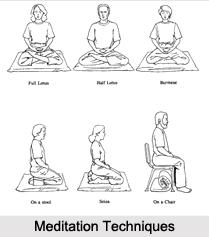In a world constantly buzzing with notifications, deadlines, and a relentless stream of information, the quest for clarity and effective decision-making has never been more crucial. Amidst this cacophony, meditation—a practice often associated with tranquility and self-discovery—has emerged as a potential tool for enhancing mental faculties. But can the serene art of meditation truly influence our ability to think critically? This article delves into the intriguing intersection of mindfulness and cognition, exploring whether the ancient practice of meditation can sharpen our analytical prowess and elevate our critical thinking skills. As we navigate through the realms of scientific research and personal anecdotes, we aim to uncover the potential impacts of meditation on the mind’s most discerning processes.
Exploring the Intersection of Mindfulness and Analytical Thought
As we delve into the synergy between mindfulness practices and analytical thinking, we find a fascinating landscape where ancient wisdom meets modern cognitive science. Mindfulness, often cultivated through meditation, encourages a state of awareness that is both reflective and attentive. This state can potentially enhance one’s ability to engage in critical thinking by fostering a clearer, more focused mind. When the mind is uncluttered, it becomes easier to evaluate information, identify biases, and approach problems with a balanced perspective.
There are several ways in which meditation might influence critical thinking abilities:
- Enhanced Focus: Regular meditation practice can improve concentration, allowing individuals to sustain attention on complex problems.
- Reduced Stress: By lowering stress levels, meditation helps prevent the cognitive overload that can hinder analytical thought.
- Increased Emotional Regulation: Mindfulness aids in managing emotional responses, which can lead to more rational decision-making.
- Improved Memory: Meditation has been linked to better memory retention, crucial for analyzing and synthesizing information.
These potential benefits suggest that integrating mindfulness into daily routines could be a valuable tool for enhancing critical thinking skills, opening doors to deeper insights and innovative solutions.
Unveiling the Cognitive Benefits of Regular Meditation Practice
As we delve into the realm of meditation and its effects on cognitive faculties, an intriguing question emerges: can the practice of meditation enhance one’s ability to think critically? Research suggests that regular meditation can significantly influence cognitive processes, potentially leading to improved critical thinking skills. Here’s how:
- Enhanced Focus: Meditation often emphasizes mindfulness, which can increase one’s ability to concentrate and maintain focus. This sharpened focus allows for more thorough analysis and evaluation of information.
- Reduced Stress: A regular meditation practice can lower stress levels, freeing up cognitive resources that might otherwise be consumed by anxiety. A calmer mind is often more adept at processing complex information.
- Improved Emotional Regulation: By fostering a greater awareness of one’s emotions, meditation can help individuals approach problems more objectively, reducing emotional biases that may cloud judgment.
These cognitive benefits collectively create a fertile ground for critical thinking to flourish. While the connection between meditation and enhanced critical thinking is still being explored, the potential is undeniably compelling.

Enhancing Decision-Making Through Mindful Reflection
Incorporating mindfulness into daily routines has been shown to offer profound benefits for the mind, particularly in enhancing the way we process information and make decisions. Meditation, a cornerstone of mindfulness practice, encourages a reflective state of mind that can lead to more deliberate and thoughtful decision-making. By fostering a sense of calm and focus, meditation allows individuals to approach problems with clarity, reducing the influence of emotional biases and habitual thought patterns.
- Increased Focus: Regular meditation practices enhance concentration, enabling individuals to sift through information more effectively.
- Emotional Regulation: By cultivating awareness of one’s emotions, meditation helps in reducing impulsivity, leading to more rational choices.
- Perspective Taking: Meditation encourages openness, allowing individuals to consider multiple viewpoints before arriving at a conclusion.
These elements collectively contribute to a more mindful approach to problem-solving, which is crucial in developing robust critical thinking skills. As a result, meditation not only nurtures the mind but also equips individuals with the cognitive tools needed for effective decision-making in various aspects of life.

Integrating Meditation Techniques for Sharper Critical Analysis
To enhance critical analysis through meditation, one can incorporate a variety of techniques that foster mental clarity and focus. Mindfulness meditation is particularly effective, as it trains the mind to stay present, reducing the noise of extraneous thoughts that can cloud judgment. This technique sharpens attention, allowing for a more profound and nuanced understanding of complex issues.
Incorporating guided visualization can also be beneficial. This technique involves envisioning scenarios or problems in a detailed, structured manner, which can enhance the ability to dissect and evaluate different components of an argument or situation. Additionally, breathing exercises can serve as a foundation for deeper concentration, helping to clear the mind and improve problem-solving skills.
- Mindfulness meditation
- Guided visualization
- Breathing exercises
Key Takeaways
As we draw our exploration to a close, the intricate tapestry woven between meditation and critical thinking skills reveals both subtle hues and vibrant patterns. While the jury may still deliberate over the definitive impacts, what emerges unmistakably is a canvas rich with potential. Meditation, in its many forms, offers a pathway to mental clarity, a journey inward that, for some, sharpens the tools of analysis and discernment. For others, it may simply provide a moment of peace in a world that often demands constant vigilance.
whether meditation serves as a cornerstone of enhanced critical thinking or a serene retreat from the chaos of daily life, its value remains uniquely personal. As we continue to navigate the ever-evolving landscape of cognitive enhancement, perhaps the true power lies not in choosing between meditation and critical thinking but in understanding how they might beautifully coexist. So, as you ponder this intersection, may you find clarity, curiosity, and the courage to explore both the mind and the heart.
